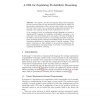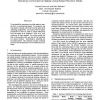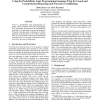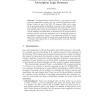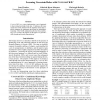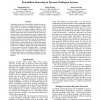119
click to vote
DSL
2009
14 years 12 months ago
2009
We propose a new focus in language design where languages provide constructs that not only describe the computation of results, but also produce explanations of how and why those r...
IJAR
2008
15 years 2 months ago
2008
The Dempster-Shafer (DS) theory of probabilistic reasoning is presented in terms of a semantics whereby every meaningful formal assertion is associated with a triple (p, q, r) whe...
128
click to vote
UAI
2000
15 years 3 months ago
2000
Qualitative probabilistic networks have been designed for probabilistic reasoning in a qualitative way. Due to their coarse level of representation detail, qualitative probabilist...
125
click to vote
FLAIRS
2000
15 years 3 months ago
2000
Qualitative probabilistic networks have been designed for probabilistic reasoning in a qualitative way. As a consequence of their coarse level of representation detail, qualitativ...
137
click to vote
IJCAI
2003
15 years 3 months ago
2003
For probabilistic reasoning, one often needs to sample from a combinatorial space. For example, one may need to sample uniformly from the space of all satisfying assignments. Can ...
133
click to vote
IJCAI
2007
15 years 3 months ago
2007
P-log is a probabilistic logic programming language, which combines both logic programming style knowledge representation and probabilistic reasoning. In earlier papers various ad...
150
click to vote
ESWS
2008
Springer
15 years 3 months ago
2008
Springer
Abstract. The demonstration presents Pronto - a prototype of a nonmonotonic probabilistic reasoner for very expressive Description Logics. Pronto is built on top of the OWL DL reas...
117
click to vote
FLAIRS
2007
15 years 4 months ago
2007
CONDORCKD is a system implementing a novel approach to discovering knowledge from data. It addresses the issue of relevance of the learned rules by algebraic means and explicitly ...
159
click to vote
AAAI
2007
15 years 4 months ago
2007
In probabilistic reasoning, the problems of existence and identity are important to many different queries; for example, the probability that something that fits some description...
133
click to vote
NMR
2004
Springer
15 years 7 months ago
2004
Springer
Probabilistic reasoning with multiply sectioned Bayesian networks (MSBNs) has been successfully applied in static domains under the cooperative multiagent paradigm. Probabilistic ...
